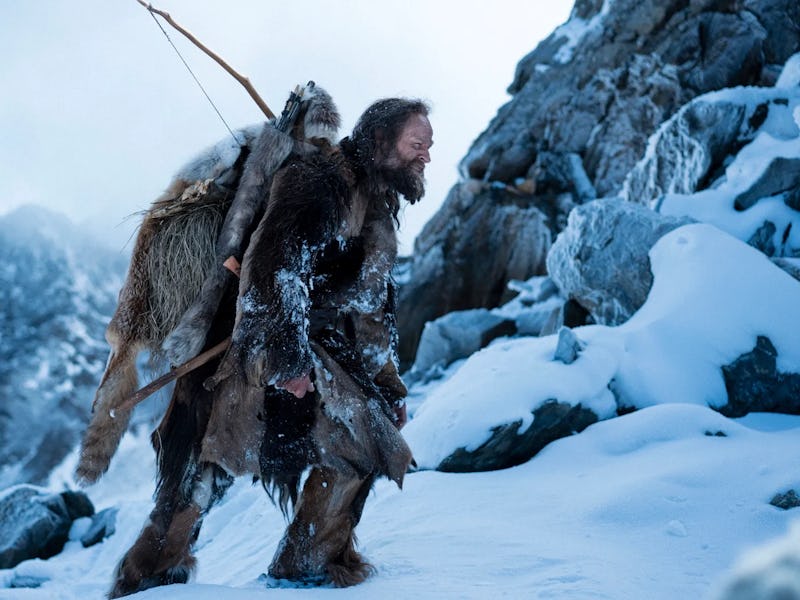How a Forgotten Sci-Fi Movie Beat Brendan Fraser to the Punch
Hijinks certainly did not ensue.

Remember Encino Man, the bawdy 1992 comedy that starred Brendan Fraser as a frozen caveman forced to readjust to 20th-century life after being thawed out in a teenager’s garage? Well, eight years earlier a slightly more cerebral film also brought a prehistoric man encased in a block of ice back to life.
Unfortunately, hijinks certainly did not ensue in Iceman, a largely forgotten yet highly rewarding piece of existential sci-fi released 40 years ago on April 13, 1984. Set almost entirely in an isolated research facility where scientists and anthropologists are busy exploring Arctic life, Iceman poses all kinds of questions about ethics, religion, and the human condition. And apart from the fast-moving finale involving accidental murder and a literally breathtaking helicopter joyride, it does so quietly and contemplatively.
Where it all begins.
The iceman in question is Char-u (John Lone). Some 40,000 years after meeting his chilly end, Char-u is discovered and found to have signs of life — much to the surprise of those about to dissect his remarkably preserved body. Thanks to impressive primitive makeup effects from Oscar winner Michael Westmore, Char-u’s open-mouthed first appearance still makes for a striking and unsettling sight. The film also cleverly encapsulates his understandable confusion, regularly showing all the prodding by a bunch of masked men under harsh lighting from his restrained point of view.
Char-u does, however, find some comfort in Timothy Hutton’s Stanley Shephard, the only doctor wise enough to show signs of humanity by removing his mask, his thick facial hair also offering a much-needed sense of familiarity. While the rest of the team want to explore the possibilities of harnessing their find’s DNA — theorizing he may be the key to the future of cryogenics — Shephard believes Char-u’s “spirit can teach us more than his flesh.”
Refreshingly, Iceman, which also features David Strathairn and Danny Glover in small roles, never tries to paint either side as the villain. Both have strong arguments and put them forward without resorting to any underhand tactics or mustache twirling. The film’s science might be just as far-fetched as Encino Man’s, but it’s still impressively methodical in its approach.
Scientist Maynard (James Tolkan) comes face-to-face with the caveman he’s helped to imprison
Of course, it’s Shephard’s stance that audiences are most likely to get behind. Despite the language barrier — Char-u only talks in various shades of grunts — and initial threats of rock-based violence, the pair develop a heart-warming unlikely bromance, albeit one conducted entirely in a vivarium designed to simulate the Stone Age. They even engage in a good old singalong, with Shephard’s take on Neil Young’s “Heart of Gold” amusingly drowned out by Char-u’s slightly more primitive melodies.
Hutton gives an empathetic turn as a man determined to let his new buddy fulfil his spiritual dreams. But it’s Lone, a future Golden Globe nominee thanks to his portrayal of real-life Chinese leader Puyi in The Last Emperor, who steals every frame he’s in without ever saying anything intelligible. In fact, the then-relative unknown should have also been in awards contention for a performance which, despite relying on little more than body language and facial expressions, is still imbued with sensitivity, sadness, and ultimately joy.
That sense of joy emerges in dramatic circumstances following the film’s late gear change. Director Fred Schepisi had made his name with on-the-run tales The Chant of Jimmie Blacksmith and Barbarosa. And after 80 minutes of more walking and talking than an Aaron Sorkin box set, Iceman suddenly transforms into a similarly action-packed revenge movie when Char-u briefly makes an escape, which, sadly for technician Maynard (James Tolkan), results in an accidental spearing. Shephard and fellow kindhearted doctor Diane Brady (Lindsay Crouse), however, soon give the caveman another chance to fulfil his destiny.
Unlikely best buddies Char-u (John Lone) and Shephard (Timothy Hutton).
As shown in one of the few scenes outside the Arctic base, Shephard learns from a nearby Inuit tribe that Char-u’s “Beedha” chants relate to a mythical bird once deemed to be a godly messenger, which explains why he got so excited at the helicopter hovering above. It’s also assumed the caveman was embarking on a sacrificial redemption quest for his people when he succumbed to the extreme surroundings.
Determined to finish the job all those millennia later, Char-u heads straight for the helicopter on his assisted second exit, clinging on to the aircraft’s landing skis as it takes flight before deliberately letting go thousands of feet in the air. It’s initially a shocking and tragic end to a story that had previously offered so much hope about the nature of mankind. But Char-u’s gleeful face on plummeting to his demise makes the finale surprisingly life-affirming.
Iceman’s pace may be a little glacial for anyone expecting the usual fish-out-of-water tropes. In a subgenre prone to style over substance, though, it’s refreshing to watch a film that doesn’t treat its audience or its subject matter like Neanderthals.